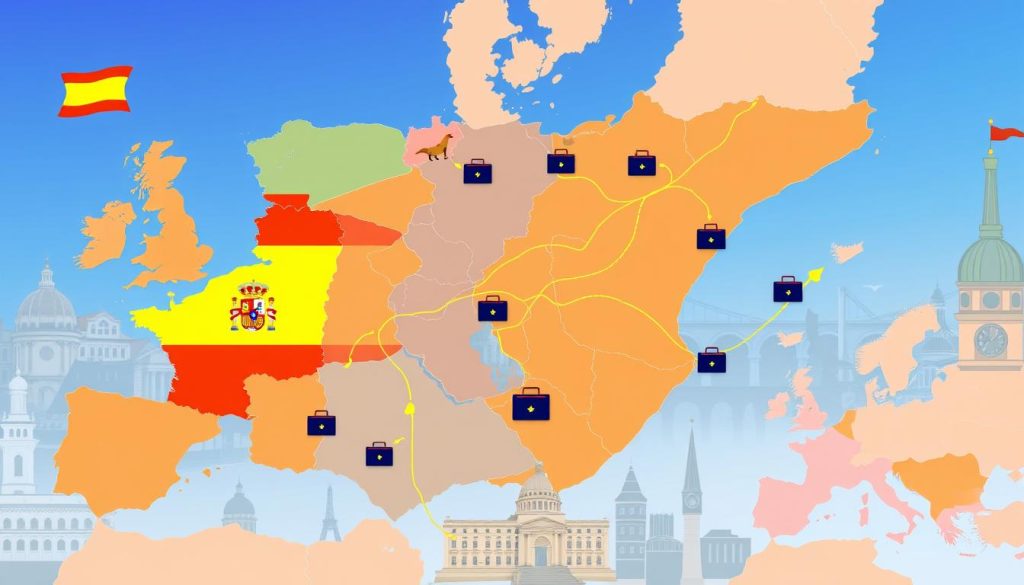Businesses worldwide are looking to grow, and Spain is an attractive choice for expansion in Europe. It offers a vibrant economy, strong growth prospects, and a key location. This creates a great setting for uncovering business opportunities in Spain.
Spain welcomes foreign investment warmly and boasts a variety of booming industries. This makes its investment landscape highly inviting. By investing in Spain, companies gain access to local markets and a stepping stone into the wider European market. This positions Spain as a vital stop for keen investors.
Introduction to Spain’s Economic Landscape

Spain’s economy is both diverse and dynamic. It offers a clear view of its recent performance. After a tough period, the economy is showing signs of getting stronger. Economic growth in Spain is on the rise, thanks to sectors like tourism, manufacturing, and agriculture.
Unemployment levels are dropping. This is boosting the business climate in Spain. Spain stands out as a big economy in the Eurozone. It draws a lot of foreign investment. This shows that people have confidence in Spain’s business-friendly laws.
The economy gets a lot from the services sector. But other innovative industries are growing too. The government is working to make Spain a great place for investment. It keeps an eye on the Spain economy overview. This helps stakeholders spot new opportunities.
The Strategic Geographic Location of Spain

Spain’s geography gives businesses big advantages for growth in Europe and other places. It’s at the crossroads of major trade paths. This strategic spot grants easy access to markets in Europe, Africa, and Latin America. The Mediterranean Sea and Atlantic Ocean help in international trade. They open doors for companies to meet various customers.
Businesses can use Spain’s geography to break into the European market well. Its transport and logistics networks are top-notch, making goods movement smooth. Spain is not just an entry to the EU but also a step towards new markets. This makes it tempting for investors from abroad.
Spain’s economy is also full of European business opportunities. The country keeps making its infrastructure better. This helps both local and international companies. It secures Spain’s role as a key center for worldwide trade.
Spain as a Gateway to the European Market

Spain sits at a key spot in the European Union, offering great access to European markets. This position, alongside a strong bond with the collective trade policy of Spain, helps businesses flourish among competitors.
Being part of the EU trade system means smooth trading across borders. Spain has many trade deals that boost both its exports and imports. This creates a great setting for businesses from around the world. Sectors like farming, clothes, and making things do really well, making Spain a top spot for investment.
With the Euro, Spain’s role in the market of Europe got even stronger. It brings stability and makes dealing with money easier for companies. Together, these factors position Spain as a key player for those looking to enter the European market.
Spain is a Door to New Business Opportunities

Spain is attracting investors globally with its unique and diverse markets. Its wide range of investment sectors is key for finding exciting opportunities.
Understanding the Diverse Markets
In Spain, markets vary from traditional ones like farming, clothes, and holiday spots to modern fields such as tech and green energy. This mix lets companies reach different people and meet various needs. It’s perfect for those looking to serve a broad audience.
Identifying Key Sectors for Investment
Spain is known for several leading investment areas:
- Technology and digital services
- Renewable energy solutions
- Agricultural innovations
- Tourism and hospitality
- Health and wellness industries
These sectors are growing fast, thanks to new consumer wants and tech progress. By tapping into these areas, businesses can use Spain’s strengths and insights for success.
Cultural Considerations in Business Engagement

Doing business in Spain is unique because of its culture. Traditions and social ties shape the business world here. Knowing the local customs and ways of dealing can really help you succeed.
The Importance of Local Languages
Language plays a key role in business, especially for building trust. Speaking Spanish helps form strong connections and shows respect in Spain. Businesses that understand this tend to do well because:
- Improved communication with clients and partners
- Enhanced negotiation processes
- Stronger relationships and rapport with local teams
- Greater insights into market trends and consumer behaviour
Also, being skilled in Spanish and understanding local business customs gives companies an advantage. Firms focusing on cultural knowledge are more likely to thrive in Spain.
Boosting Trade Opportunities Through Free Trade Agreements

The way countries trade has changed a lot. Spain is making smart moves by signing free trade agreements. These agreements help different industries in Spain and abroad, making it easier for them to do business with each other.
Spain is working more with countries outside the EU. This has really helped it trade more globally. Places like Mexico, Canada, and countries in Latin America have made important deals with Spain. These deals help businesses easily move goods across borders.
Key benefits coming from these deals include:
- Lower tariffs, which reduces costs for exporting and importing goods.
- Better access to markets, helping companies find more customers.
- Improved competitiveness by working closely with big economies.
With more free trade agreements, Spanish businesses should see more chances to grow and innovate. These agreements are key for Spain as it works through the global economy’s challenges.
Spain’s Thriving Tech Startup Ecosystem

Spain is becoming a key player in the tech startup world. It boasts an impressive mix of talent and innovative ideas. Barcelona and Madrid are leading the way, drawing in entrepreneurs from inside and outside Spain. This vibrant setting encourages creative and tech advances, making Spain a top choice for new tech startups.
Key Cities for Tech Entrepreneurs
Barcelona and Madrid are central spots for entrepreneurs. They offer strong support systems that encourage working together and creating new things. These cities are alive with culture and offer:
- A diverse network of co-working spaces and tech incubators.
- Access to a skilled workforce with expertise in various sectors.
- A rich array of networking opportunities through events and meetups.
This energetic environment isn’t just about sparking innovation. It also helps startups in Spain find funding with the help of local and international investors eager to back new projects.
Government Initiatives Supporting Startups
The government is playing a big part in helping tech startups grow. It has launched many support schemes, including:
- Funding programmes aimed at young companies.
- Tax incentives for investors and startups.
- Support for cross-border collaboration initiatives.
With a focus on innovation, these measures show Spain’s dedication to a thriving startup scene. This commitment turns Spain into a shining example of tech opportunity.
Renewable Energy Sector Growth in Spain

Spain leads in renewable energy, thanks to huge steps in solar and wind power. The government’s actions have sparked immense growth in this area. Spain wants to meet its energy needs in a green way and be a major part of the global shift to cleaner energy.
Investment Opportunities in Green Technologies
Spain offers great chances for companies to invest in green tech. Thanks to government perks like tax cuts and funding, investing in clean energy looks very attractive. There are key areas for investment, such as:
- Solar energy projects, making the most of Spain’s sunny climate.
- Building wind farms, especially near the sea.
- Creating new ways to store energy efficiently.
- Putting money into research on cutting-edge green tech.
Investing in renewables in Spain can bring big rewards and help the environment. It supports sustainability and boosts Spain’s economy in a world that’s quickly changing.
Tourism and Service Industries as Economic Pillars

The Spanish tourism sector is vital for the economy. It adds a lot to the gross domestic product (GDP) and creates many jobs. In 2019, Spain saw about 83 million visitors from abroad. This brought in more than €90 billion from tourism. Such a huge number of tourists highlights the importance of services in Spain.
Tourism showcases Spain’s rich cultural heritage and scenic beauty. It also boosts services like hotels, travel, and entertainment. About 70% of people work in the service industry, making it a key economic pillar. The service sector has been growing at 4.4% each year and attracts foreign money.
Investors are keen on exploring the tourism market. This includes hotels, eco-friendly travel, and food culture. As travel trends change, sustainable tourism is becoming popular. It focuses on experiences that respect local traditions and protect nature.
The outlook for Spain’s tourism and service industries is very promising. There are great chances for working with international partners. This will help improve and grow these critical parts of the economy.
Networking and Collaboration Platforms in Spain

Spain is a hotspot for business networking, making it perfect for local and international firms to come together. Its networking scene, through trade shows and expos, plays a key role in forging strong partnerships. These events give insights into the latest industry trends and let businesses meet directly, overcoming usual communication barriers.
Trade Shows and Business Expos
Trade shows in Spain are crucial for meeting potential clients and suppliers. They draw businesses from varied sectors, offering a chance to display products, understand market needs, and see what others are doing. Here are a few trade shows that are great for networking in Spain:
- Fitur (Madrid) – A top tourism event attracting professionals worldwide.
- Mobile World Congress (Barcelona) – The biggest mobile industry expo, with vast networking opportunities.
- Salón Internacional del Caravaning (Barcelona) – Targets the caravan and camping industries, drawing international crowds.
- Fruit Attraction (Madrid) – Focuses on the fruit and vegetable industries, promoting innovation and sustainability.
Being part of these events opens doors to the Spanish market by establishing key business links. Networking here can spark partnerships that improve business activities and extend market presence.
The Role of Infrastructure in Business Expansion

In Spain, building strong infrastructure is key for business growth. It helps to attract investments and boost the economy. Good roads, rails, and internet are essential for companies to thrive locally and worldwide.
Transport and Logistics Developments
Spain’s upgrades in infrastructure focus on transport and logistics. This includes roads, rails, ports, and digital networks. Key upgrades have been made:
- High-Speed Rail System: Spain has a big high-speed train network. It connects cities fast, helping businesses reach markets quickly.
- Modern Ports: Big ports like Barcelona and Valencia have top facilities. They make international trade easier.
- Road Infrastructure: Better roads and highways mean goods move smoothly. This ensures timely delivery to customers.
- Digital Connectivity: Better internet helps businesses manage logistics well. It also allows for tracking shipments in real time.
These improvements help Spain attract local and global companies. As logistics improve, Spain becomes a strong competitor in the world market. It offers great chances for businesses to expand and succeed.
Financial Services and Investment Opportunities

Spain’s financial sector has grown a lot, thanks to a strong banking scene. It has adapted to changes in the market well. This has opened up many opportunities for investors from Spain and beyond.
Spain offers a variety of investment options. There’s a growing interest in venture capital for startups and new businesses. Financial tools like stocks, bonds, and derivatives help in raising capital. They suit different risk preferences. Investors have access to well-established banks for financial advice, wealth management, and corporate finance.
Spain is a great place for investing in Europe. Its strategic location makes it an ideal gateway for firms looking to expand in Europe. The lively financial services market boosts capital movement. It also creates a good setting for innovation and growth in many areas.
Navigating Legal and Regulatory Frameworks

Entering the Spanish market means getting to know the Spain legal framework well. This includes various laws and rules for running a business smoothly. Companies need to follow these rules closely to avoid risks and do well.
To start, registering your business is key. This means letting the right authorities know about your company. This involves submitting details about who owns the company and what it does.
Tax rules in Spain are very important for businesses. Companies have to make sure they report earnings correctly, handle VAT properly, and submit the right tax forms. Knowing these tax rules well helps a company stay in line with Spanish laws and keep its finances healthy.
- Familiarise yourself with local laws to avoid penalties.
- Consult legal experts when drafting contracts or agreements.
- Be mindful of data protection regulations, especially with GDPR in effect.
Dealing with compliance in Spain is crucial for businesses starting there. Doing your homework and following the legal rules will make things run smoothly. This helps a business grow and succeed in Spain over time.
Success Stories: Foreign Businesses Thriving in Spain

Many foreign businesses have found success in Spain, showing it’s a great place for diverse sectors. They’ve not just entered the Spanish market but have also flourished impressively. This part will shed light on their strategies, obstacles, and the outcomes they achieved.
Case Studies of Successful Entrants
Here are some examples that show how foreign companies have done well in Spain:
- IKEA: This Swedish company won over Spanish customers by creating stores that match their taste and needs.
- Amazon: Amazon improved its delivery in Spain, meeting the growing need for online shopping solutions.
- Samsung: Samsung focused on research and development in Spain. This helped create products that Spanish customers really want.
These examples prove that success in Spain comes from understanding and connecting with the local market. It’s not just about selling. It’s about building relationships with Spanish customers and adapting to what they like.
Future Trends in Spain’s Business Environment

Spain’s business world is changing fast, thanks to many influences that shape what comes next. New sectors are set to change the economy, especially in fields like artificial intelligence, biotechnology, and green farming. There’s a big move towards using new inventions and tech.
Tech growth is key in these changes. Things like automation and getting more digital are critical in many areas. Companies are keeping up with these trends, which makes Spain look good for money coming in from other countries. It means doing things better and faster, attracting investors from abroad.
Green efforts are getting more attention. Spain is working on using more renewable energy and being eco-friendly. This is in line with what’s happening worldwide and draws in investors who care about the environment. So, areas focusing on being sustainable are likely to do well and boost the market.
- Growth in tech and innovation-driven industries.
- Emphasis on sustainability and green technologies.
- Rising importance of digital transformation.
- Increased foreign direct investment opportunities.
Keeping an eye on these trends helps businesses thinking about the Spanish market. They’ll need to tweak their plans to fit with these changes to do well in Spain’s competitive future.
Challenges and Risks in the Spanish Market

Starting a business in Spain comes with challenges. These include competition, cultural differences, and economic changes. Knowing these issues helps with planning and fitting into the local market. It’s crucial for businesses to look into risks they might face in Spain.
Market Entry Challenges
The Spanish market can be complex to enter. Here are some major concerns:
- Market Saturation: Many sectors are full of competition. It’s important to stand out.
- Cultural Differences: Understanding local habits and what people like is key. Getting it wrong can mean failing to connect with customers.
- Economic Volatility: The economy’s ups and downs affect buying patterns. Companies need to adjust fast.
Getting past these obstacles requires careful planning. Doing market research, teaming up locally, and making marketing culturally sensitive are good steps. Being proactive and keeping an eye on competition helps avoid risks, making it easier to get into the market.
Conclusion
Spain is a lively and varied market full of opportunities for local and global entrepreneurs. It has a key location, excellent infrastructure, and government support. This makes Spain a great place for business growth. The country’s technology, renewable energy, and tourism sectors are especially promising for investments.
Understanding the market and culture in Spain is vital for grabbing these chances. Spain’s rich culture and active economy offer many ways for businesses to grow. It is a great place for anyone looking to start a new venture.
So, if you’re thinking about where to go next, Spain should be at the top of your list. This article showed the benefits and strategic reasons for doing business in Spain. It’s clear that Spain is a smart choice for future business leaders.














